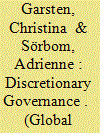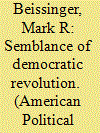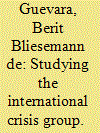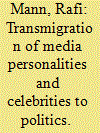|
|
|
Sort Order |
|
|
|
Items / Page
|
|
|
|
|
|
|
| Srl | Item |
| 1 |
ID:
184666


|
|
|
|
|
| Summary/Abstract |
Built on the exclusive funding of 1,000 large transnational corporations, the World Economic Forum is a not-for-profit Swiss foundation, aiming to shape the direction of globalization. Its events are characterized by low degrees of formality and transparency. Research on what this organization does is scarce. This article suggests the term discretionary governance to capture the precarious, yet existing, social order that the organization shapes. By discretionary governance, we mean a set of discreet practices based on the organization’s judgement in ways that escape established democratic controls. Drawing on ethnographic data the paper demonstrates how selection, secrecy, and status form key components of this tenuous ordering. Selection processes and secrecy contribute to status elevation of the individuals and organizations chosen to participate. Upon them and the organization itself is bestowed a symbolic capital that is practical and possibly profitable in the world of global governance.
|
|
|
|
|
|
|
|
|
|
|
|
|
|
|
|
| 2 |
ID:
127817


|
|
|
|
|
| Publication |
2013.
|
| Summary/Abstract |
Using two unusual surveys, this study analyzes participation in the 2004 Orange Revolution in Ukraine, comparing participants with revolution supporters, opponents, counter-revolutionaries, and the apathetic/inactive. As the analysis shows, most revolutionaries were weakly committed to the revolution's democratic master narrative, and the revolution's spectacular mobilizational success was largely due to its mobilization of cultural cleavages and symbolic capital to construct a negative coalition across diverse policy groupings. A contrast is drawn between urban civic revolutions like the Orange Revolution and protracted peasant revolutions. The strategies associated with these revolutionary models affect the roles of revolutionary organization and selective incentives and the character of revolutionary coalitions. As the comparison suggests, postrevolutionary instability may be built into urban civic revolutions due to their reliance on a rapidly convened negative coalition of hundreds of thousands, distinguished by fractured elites, lack of consensus over fundamental policy issues, and weak commitment to democratic ends.
|
|
|
|
|
|
|
|
|
|
|
|
|
|
|
|
| 3 |
ID:
133254


|
|
|
|
|
| Publication |
2014.
|
| Summary/Abstract |
This special issue studies the International Crisis Group (icg), one of the most notable and widely referenced producers of knowledge about conflict areas, used extensively by policy makers, the media and academics. The authors take different theoretical and methodological approaches to make sense of this hard-to-ignore conflict expert, exploring the icg's daily operations and role in international politics. This introduction sets the scene by offering a critical exploration of the organisation and its approach to the construction of political knowledge. It analyses the icg's position in the conflict-related knowledge market and the sources of its expert authority. It then discusses the organisation's roles - from mediation to instrumentalisation - in the 'battlefield of ideas' in conflict and intervention contexts and its potential to make an impact on policy framings and outcomes. It shows that studies of the icg need to 'unpack' the organisation in order to account for it as both a highly successful international expert brand and a very heterogeneous actor in specific contexts and at specific times.
|
|
|
|
|
|
|
|
|
|
|
|
|
|
|
|
| 4 |
ID:
137549


|
|
|
|
|
| Summary/Abstract |
The electoral success of Yair Lapid's Yesh Atid party in the 2013 Knesset elections is discussed in this article as a test case of a worldwide phenomenon of celebrities, among them media personalities, who enter the political field. Bourdieu's interpretive research framework regarding symbolic and social capitals, as well as media capital, is used here to analyse Lapid's versatile career and celebrity status as the background to his performance during the campaign and his ability to win 19 seats in the Knesset. The article also places Lapid's case in the context of political and social developments in Israel in the last decades.
|
|
|
|
|
|
|
|
|
|
|
|
|
|
|
|
|
|
|
|
|